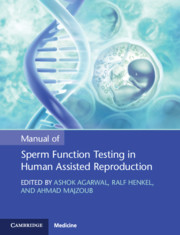Book contents
- Manual of Sperm Function Testing in Human Assisted Reproduction
- Cambridge Laboratory Manuals in Assisted Reproductive Technology
- Manual of Sperm Function Testing in Human Assisted Reproduction
- Copyright page
- Dedication
- Contents
- Contributors
- Short Biography
- Foreword
- Preface
- Introduction
- Chapter 1 Standard Semen Examination: Manual Semen Analysis
- Chapter 2 Standard Semen Analysis: Computer-Assisted Semen Analysis
- Chapter 3 Standard Semen Analysis: Home Sperm Testing
- Chapter 4 Standard Semen Analysis: Leukocytospermia
- Chapter 5 Standard Semen Analysis: Morphology
- Chapter 6 Sperm Vitality: Eosin-Nigrosin Dye Exclusion
- Chapter 7 Sperm Vitality: Hypo-Osmotic Swelling Test
- Chapter 8 Determination of Mitochondrial Membrane Potential by Flow Cytometry in Human Sperm Cells
- Chapter 9 Capacitation and Acrosome Reaction: Fluorescence Techniques to Determine Acrosome Reaction
- Chapter 10 Capacitation and Acrosome Reaction: Histochemical Techniques to Determine Acrosome Reaction
- Chapter 11 Zona Binding: Competitive Sperm-Binding Assay
- Chapter 12 Zona Binding: Hemizona Assay
- Chapter 13 Oolemma Binding: Sperm Penetration Assay
- Chapter 14 Oxidative Stress Testing: Direct Tests
- Chapter 15 Oxidative Stress Testing: Indirect Tests
- Chapter 16 Chromatin Condensation: Aniline Blue Stain
- Chapter 17 Chromatin Condensation: Chromomycin A3 (CMA3) Stain
- Chapter 18 Sperm Chromatin Structure: Toluidine Blue Staining
- Chapter 19 DNA Damage: TdT-Mediated dUTP Nick-End-Labelling Assay
- Chapter 20 DNA Damage: Sperm Chromatin Structure Assay
- Chapter 21 DNA Damage: COMET Assay
- Chapter 22 DNA Damage: Halo Sperm Test
- Chapter 23 DNA Damage: Fluorescent In-Situ Hybridization
- Chapter 24 Clinical Value of Sperm Function Tests
- Chapter 25 Future Developments: Sperm Proteomics
- Conclusion
- Index
- References
Chapter 20 - DNA Damage: Sperm Chromatin Structure Assay
Sperm Chromatin Structure Assay Test on its Fortieth Anniversary
Published online by Cambridge University Press: 05 April 2021
- Manual of Sperm Function Testing in Human Assisted Reproduction
- Cambridge Laboratory Manuals in Assisted Reproductive Technology
- Manual of Sperm Function Testing in Human Assisted Reproduction
- Copyright page
- Dedication
- Contents
- Contributors
- Short Biography
- Foreword
- Preface
- Introduction
- Chapter 1 Standard Semen Examination: Manual Semen Analysis
- Chapter 2 Standard Semen Analysis: Computer-Assisted Semen Analysis
- Chapter 3 Standard Semen Analysis: Home Sperm Testing
- Chapter 4 Standard Semen Analysis: Leukocytospermia
- Chapter 5 Standard Semen Analysis: Morphology
- Chapter 6 Sperm Vitality: Eosin-Nigrosin Dye Exclusion
- Chapter 7 Sperm Vitality: Hypo-Osmotic Swelling Test
- Chapter 8 Determination of Mitochondrial Membrane Potential by Flow Cytometry in Human Sperm Cells
- Chapter 9 Capacitation and Acrosome Reaction: Fluorescence Techniques to Determine Acrosome Reaction
- Chapter 10 Capacitation and Acrosome Reaction: Histochemical Techniques to Determine Acrosome Reaction
- Chapter 11 Zona Binding: Competitive Sperm-Binding Assay
- Chapter 12 Zona Binding: Hemizona Assay
- Chapter 13 Oolemma Binding: Sperm Penetration Assay
- Chapter 14 Oxidative Stress Testing: Direct Tests
- Chapter 15 Oxidative Stress Testing: Indirect Tests
- Chapter 16 Chromatin Condensation: Aniline Blue Stain
- Chapter 17 Chromatin Condensation: Chromomycin A3 (CMA3) Stain
- Chapter 18 Sperm Chromatin Structure: Toluidine Blue Staining
- Chapter 19 DNA Damage: TdT-Mediated dUTP Nick-End-Labelling Assay
- Chapter 20 DNA Damage: Sperm Chromatin Structure Assay
- Chapter 21 DNA Damage: COMET Assay
- Chapter 22 DNA Damage: Halo Sperm Test
- Chapter 23 DNA Damage: Fluorescent In-Situ Hybridization
- Chapter 24 Clinical Value of Sperm Function Tests
- Chapter 25 Future Developments: Sperm Proteomics
- Conclusion
- Index
- References
Summary
The year 2020 is the fortieth anniversary of the introduction of the concept of “sperm DNA fragmentation” as related to human and animal male factor fertility. This concept was introduced by Donald Evenson in a Science article (1980) that also introduced the first test for its detection, the Sperm Chromatin Structure Assay (SCSA®). Sperm DNA fragmentation is defined as sperm single and double DNA strand breaks. Experiments on bulls, boars and stallions clearly show that the SCSA test identifies the highest fertile animals. Thousands of measurements on clinical human semen samples also clearly show that when more than 25 percent of sperm (DFI pecentage) in an ejaculate have measurable DNA fragmentation the probability of live birth pregnancy is significantly diminished. SCSA data on percentage DFI and Mean DFI are the same, meaning that the SCSA test measures the total of sperm DNA strand breaks detected with acridine orange staining.
- Type
- Chapter
- Information
- Manual of Sperm Function Testing in Human Assisted Reproduction , pp. 192 - 201Publisher: Cambridge University PressPrint publication year: 2021
References
- 4
- Cited by

